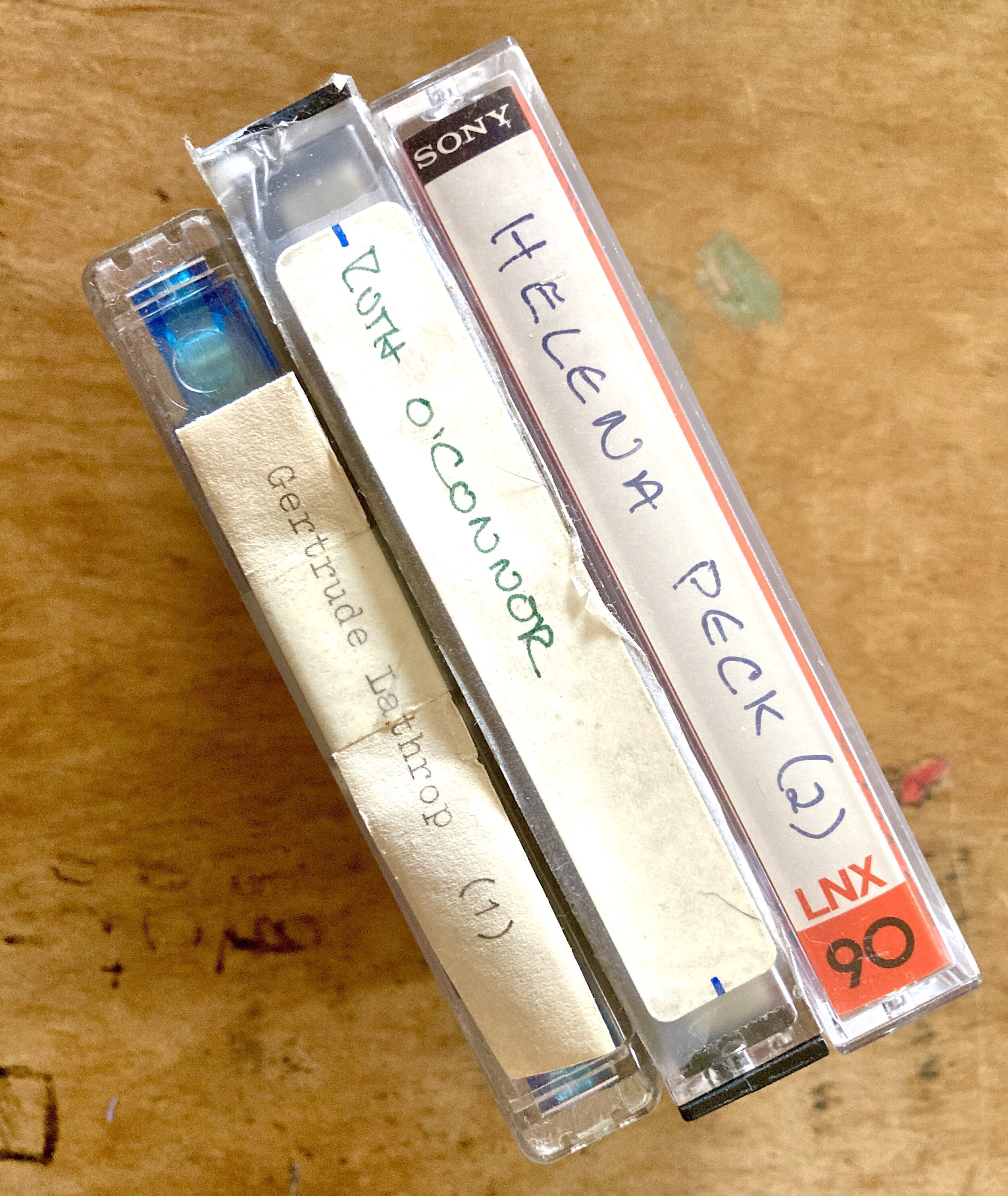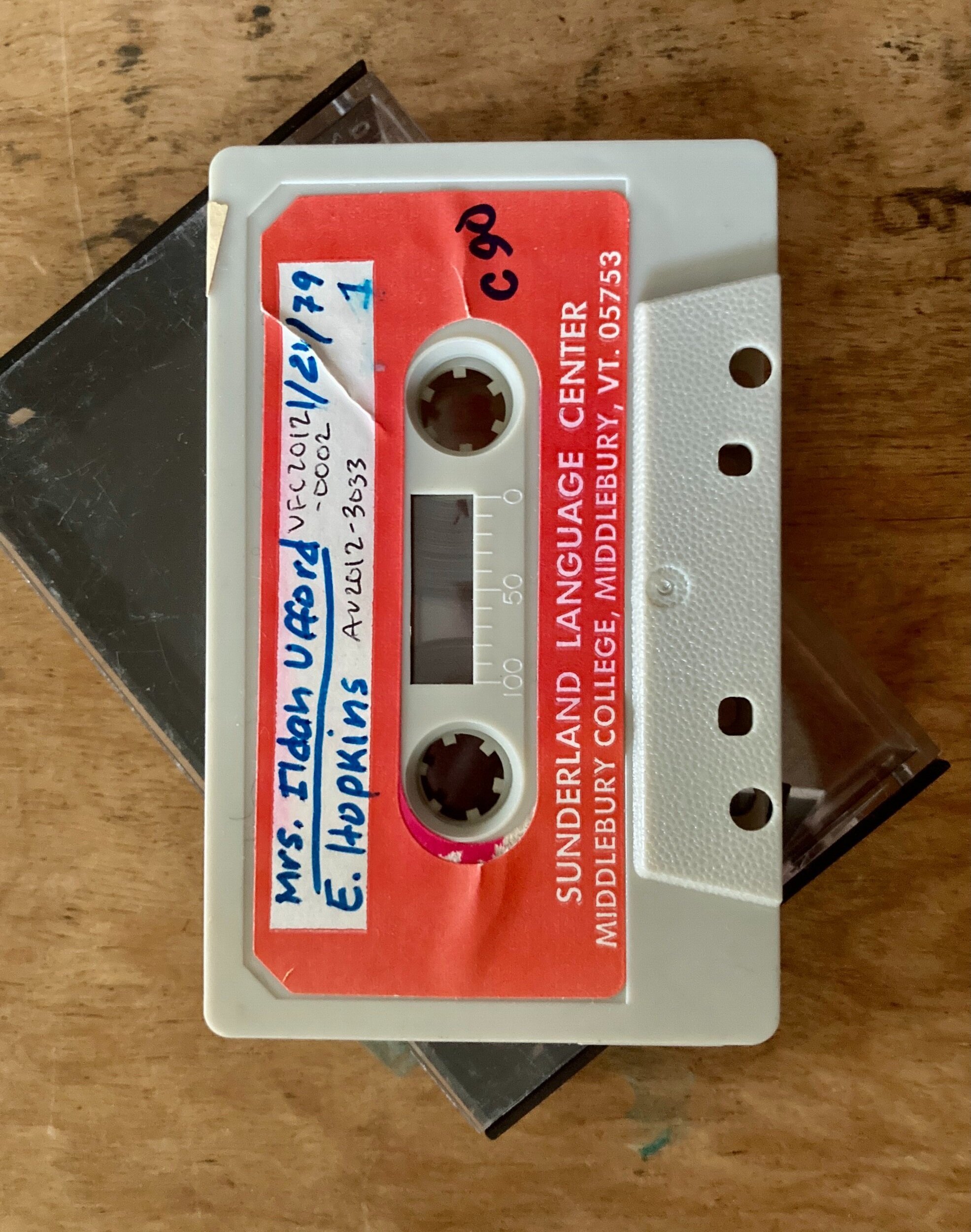Donated collection sees new life in VPR radio program
The Vermont Folklife Center archive holds over 6,000 audio recordings of interviews with Vermonters. Many have been conducted by VFC staff, but the Center also accepts materials donated by others who have conducted ethnographic and oral history research in Vermont and the surrounding region. This is the first in a series of posts that explores the archive through projects donated by outside researchers.
The “Margaret K. Nelson Collection”
This month the producers of VPR’s Brave Little State podcast were in touch with us as they researched an episode on the history of school closings in Vermont—with a focus on the state’s legacy of one-room schoolhouses. Their particular interest? A collection of recordings deposited in the VFC Archive in 2012 by Middlebury College Professor Emerita of Sociology Margaret K. Nelson, known locally as Peggy. In the 1980s Professor Nelson and a team of research assistants recorded interviews with 36 women who had taught in schools in Addison County prior to 1950, many of whom had seen the transition from one-room schoolhouses to “graded” schools. The interviews she created with her assistants aligned perfectly with Brave Little State’s research question, which we love.
The VFC Archive and collections like ours document human memory and contemporary, lived experience. Through them we maintain intimate touchstones to the past that can inform our thinking about both our present day lives and the future we want to build. Toward this end, we are thrilled to see our collection used and brought out into the world. Prof. Nelson is likewise thrilled to have her audio recordings find a new audience. We spoke with her to gain some more background on the collection. This interview was conducted over Zoom. The text has been shortened for clarity and brevity.
A conversation with Prof Nelson:
Mary Wesley: How did you come to do this research?
Peggy Nelson: I came to Middlebury in 1975 and shortly after, in the 1980s, I was really interested in women's history and at that point people were doing a lot of writing about particular occupations that women had. I mean, there was almost no women's history at that time. It just wasn't. The field was being invented and I became interested in the one- room schoolhouse teachers as an example of one kind of employment women could have in the early part of the 20th century. I got a research grant from the National Endowment for the Humanities to do some studying, and I started conducting interviews. Then I got a grant from this organization called Earthwatch, and they sent about half a dozen women of all different ages to come to Vermont through the summer for two weeks and collect some other data from that project.
It was particularly interesting for me because some of the people who did the interviews were themselves teachers. And they asked different questions. I was kind of interested in women's occupations and how schoolteaching fit into their [the school teachers’] whole lives. And they were interested in how you handle discipline? What about isolation? They just were interested in different sets of questions, which were really interesting to me.
Mary: What did you do with your findings?
Peggy: I wrote a book chapter and several articles and then I kind of moved on to other things in the mid ‘80s. I never wrote the book I had planned to write, which is too bad, but I did do a bunch of interviews and then they just sat there for an awful lot of time. When I retired, or was thinking about retiring, because I've done a lot of interviewing in my life, I had box after box after box of tapes! And somebody said to me, ‘You know, audiotapes disintegrate and they may not be any good.’ And so eventually I brought them over to the Vermont Folklife Center and said, if you can preserve these in some way...so I'm really delighted to hear that somebody is using them.
As we mentioned earlier, Peggy’s original tapes have been part of our collection since 2012. At this time we have digitized the vast majority of them, and we working toward completing the remainder. If you’d like to access the collection, please contact our archivist.
Sharing the collection
The Brave Little State episode is not the first time Peggy’s interview collection has been referenced or shared. In 2014, in collaboration with Vermont photographer Diana Mara Henry Peggy worked to create an exhibit hosted at the Vermont Folklife Center. The articles and book chapters that Margaret wrote based in part on this research are listed here:
“From the One-Room Schoolhouse to the Graded School: Teaching in Vermont, 1910-1950.” Frontiers: A Journal of Women Studies, 1983, Vol. 7, No. 1, Women's Oral History Two (1983), pp. 14-20; Published by: University of Nebraska Press.
“The Threat of Sexual Harassment: Rural Vermont School Teachers, 1915-1950.” The Journal of Educational Foundations, Summer 1988; 2, 2; Periodicals Archive Online pg. 61
“The Intersection of Home and Work: Rural Vermont Schoolteachers, 1915–1950.” Chapter in The Teacher's Voice: A Social History Of Teaching In 20th Century America, edited by Richard J. Altenbaugh, Routledge, 1992, pp. 25-38
Finally, you can listen to the most recent project related to this collection--the latest episode of Brave Little State!
Thanks to Peggy Nelson for speaking with us about this collection.


